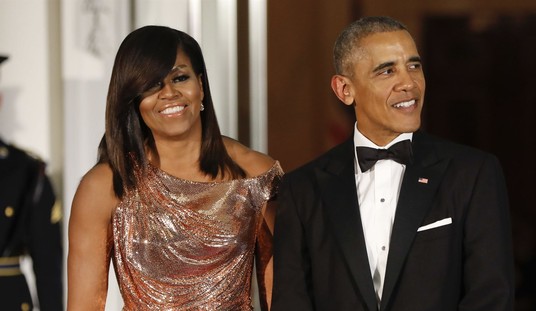As we wait for Godot — I mean President Obama’s address to the American people on Tuesday night — it looks at present as if both the House and Senate will not grant him the “yes” vote that he is seeking on a Syria strike.
I have read virtually every op-ed and argument on all sides of the question that have appeared, from people on both sides whose views I respect, and one of the problems is that there are good arguments to make on both sides. Today I watched Fox News Sunday, the impressive panel on Fareed Zakaria’s GPS, which included General Wesley Clark and Paul Wolfowitz, and a separate interview with Bernard Henri-Levy. And of course, as readers know, I have exchanged arguments on this site with Bryan Preston.
On the interventionist side, I have considered the views of Bill Kristol, Stephen F. Hayes, Eliot Cohen, Clifford D. May, and many others. Read them for yourself. If we have a stake in the outcome, and we do, we cannot ignore their arguments. This is particularly true if you believe that we must stay out of Syria.
On the non-interventionist side, I have read Kathleen Parker, Andy McCarthy, Victor Davis Hanson, Charles R. Kesler, Fareed Zakaria and others who hold a similar perspective. If you are on the side of those who favor a strike, you have the obligation to think and listen to their arguments against it.
One side makes the case; the other side rebuts it. That is what a serious debate should be. But let me single out one essay in particular and take up the problems with the interventionist perspective. The argument comes from none other than Rep. Eric Cantor, the majority leader in the House of Representatives.
Rep. Cantor knows well that his position is unpopular among those who live Virginia’s 7th District, which he represents. As he writes, his constituents have let him know that they have “serious questions” about the propriety of U.S. involvement. He answers that he believes “America has a compelling national security interest to prevent and respond to the use of weapons of mass destruction … especially by a terrorist state, and to prevent further instability in a region of vital interest to the United States.”
Cantor argues that Syria is more than a civil war, that it is also a proxy war — in which the victory of the Assad regime would be “a strategic victory for his Iranian patrons, [would] embolden the radical Islamic terrorist group Hezbollah…and convince our allies that we cannot be trusted.”
Cantor worries that if we do nothing, eventually the Assad regime will see to it that the chemical WMDs are eventually used against major U.S. interests; in other words, a strike would be a note to our enemies that they cannot take the slippery slope towards advancing military means that would threaten us in the Middle East and elsewhere.
Next comes the least convincing part of Cantor’s argument. He raises the point of those who question whether by intervening we would be “actually helping al-Qaida” and thus end up replacing “one evil with an even greater evil.” Here is what he then argues:
But extremist groups represent only a minority of those opposing Assad. Moderate opposition groups leading the fight against Assad are under attack by al-Qaida as well, and if this conflict draws on, more foreign jihadists will join the extremists and threaten moderate elements.
Continued American inaction will undermine these moderate forces and empower the extremist terrorists who seek to displace them. Right now, the extremists are exploiting the argument that the moderates cannot rely on the U.S. to come to their aid or even enforce our own red lines. It is in our interests that neither Assad – a primary sponsor of terrorism – nor al-Qaida comes out on top.
The problem is that intelligence reports, as Reuters let its readers learn, “contradict Secretary of State John Kerry’s public assertions that moderate Syrian opposition groups are growing in influence [and] appear to be at odds with estimates by U.S. and European intelligence sources and nongovernmental experts, who say Islamic extremists remain by far the fiercest and best-organized rebel elements.”
The radical Islamists are better-organized, better-trained, and, while possibly numerically less, better-positioned to expand their influence and hence take over Syria if the Assad regime collapses. And the Nusra Front, by all accounts, is currently the most effective and best-armed of all the rebel groups. Hence even the true moderate forces see the need for joining with them in a coalition, a tactic that ensures the moderates’ eventual defeat in case of victory against the Assad armed forces. And it does not offer confidence that Kerry, when challenged by opponents in Congress who had doubts about Kerry’s belief that the moderates are gaining strength, based his answer that they are doing well on the views of a young, compromised “journalist” named Elizabeth O’Bagy.
The Reuters dispatch quotes the views of former intelligence analyst Joshua Foust, who says, “I’ve heard that there are moderate groups out there we could, in theory, support, but I’ve heard from those same people and my own contacts within (U.S. intelligence) that the scary people are displacing more and more moderate groups. Basically, the jihadists are setting up governance and community councils while the moderates exhaust themselves doing the heavy fighting.’” Most disturbing, Foust reports that four out of five commanders of the moderate Supreme Military Council of the rebel groups threatened to resign because they want to work with “all forces” fighting Assad, meaning the Nusra Front run by al-Qaeda.
Another European official also notes that while the forces in the east are perhaps more moderate than those in the south, they have broken up into gangs involved in enriching themselves. And today, Reuters reports that “the chief of staff of Germany’s armed forces, General Volker Wieker, also told lawmakers the influence of al-Qaeda linked forces with within the rebels was becoming stronger and stronger.”
So much for the argument presented last week by John Kerry. This evidence undercuts the case made by Cantor as well, since he argues the al-Qaeda is fighting the moderate groups in Syria, and that more jihadists will join the extremists unless we strike. If foreign intelligence is to be believed, such as that from German sources, they already have done just that.
How, then, will continued U.S. inaction undermine moderate forces, who seem to have already lost so much ground that their case seems rather hopeless? For the U.S. to come to their aid, as Cantor argues, would necessitate something much greater than the limited action President Obama has called for up to now.
So far, what the president has called for is anything but the kind of strike that will hurt the Assad regime’s military capacity. Moreover, he has not stated any post-attack plan that would entail not only real support to confirmed actual moderate groups, but also some kind of U.S. effort that could reinforce their strength and position them to win against both Muslim Brotherhood and Salafist elements, if indeed those do exist.
If no real plan exists — and Obama has not given us any evidence that it does — what Fareed Zakaria writes will be the outcome. “It will find it extremely difficult,” he writes, “to keep its actions limited in a volatile situation. And were it to succeed in ousting Assad, it would be implicated in the next phase of this war, which would almost certainly lead to chaos and the slaughter or ethnic cleansing of the Alawite sect (to which Assad belongs) and perhaps of other minorities, as happened in Iraq.”
So the old foreign-policy divisions have been swept away with the wind. Who would have thought that the hawkish position would be advanced by Nancy Pelosi and John Kerry, and that Republicans in both the House and Senate would be leading the opponents of intervention?
And as the president has learned, many in his own party have doubts and are not anxious to support him. This is no longer the ’90s, when a Democratic president, Bill Clinton, launched air strikes in the Balkans and fired cruise missiles in Iraq and Afghanistan without congressional support. Barack Obama, too, said he could act and would act without going to Congress, only to change his mind at the last minute, undercut Secretary of State Kerry’s speech arguing for immediate and forceful action, and then throw the decision to Congress.
His deputy national security advisor told the press a few days ago that if Congress votes no, the president would not go against them. At the European press conference, Obama said his deputy did not exactly say what he actually had said. That, of course, was no answer. No wonder many believe that the president hopes for a no vote and that Congress will give him the out he really wants, so he can resume being the anti-war chief executive he promised the Left he would be.
So we wait for Obama, and for what message he actually will give to the American people on Tuesday night. No wonder it appears as if we are living in the Theater of the Absurd.









Join the conversation as a VIP Member